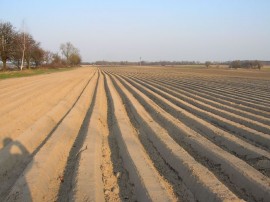
A very fine speech this evening by Chris Haskins, giving the second UACES Lecture on the future of Europe, on “CAP reform: a watershed for the European Union?” Chris Haskins is chair of the European Movement, a farmer, and was a very successful chairman of Northern Foods, so he is in an ideal position to comment on the subject.
Trying to summarise, he suggested that the recent reforms agreed while Franz Fischler was commissioner for agriculture will have a deeper impact than is generally understood at present. They mark a definitive move away from payment to farmers for production to payment for farmers for other reasons, which will in turn provoke the question of why farmers should be paid at all. The future of the CAP, he said, lies in national funding policies for farmers to achieve such social and environmental objectives as national governments might wish to pay for. Much of the reason for the CAP has been superseded by the subsequent creation of the single market: there is no reason to treat farming differently from other industries.
In turn, removing agriculture from the EU budget will create more space for investment in infrastructure in the new member states and for spending on research and development. Both of these two areas are popular with the public and also clearly things that can only be done at the European level. They can be part of the new purpose of the EU, something which is certainly needed. Farm spending does not obviously need the European level and so undermines the credibility of the EU in the eyes of the citizen.
A reform of the CAP would therefore be good both for the agricultural sector and for the EU in general. If I can get hold of the text, I will post a link to it as it deserves to be read in full rather than just in my abbreviated version.
An important question put from the floor was why the CAP has been so hard to reform. How come the farming lobby is so powerful? There were various answers forthcoming.
First, from Chris Haskins, there was the urgent need to develop European agricultural output in the years following the second world war. This was a need felt throughout the EU – the UK included – and established a strong culture of financial support for farmers, which the farmers themselves became well-organised to defend.
It must be noted that in many parts of the EU there has been a considerable move from the countryside to the cities within living memory. The general urbanisation of the population may have taken place in the UK in the 18th and 19th centuries, but it is much more recent elsewhere – post-war in France and Italy and in Poland, it is yet to happen at all. Even though the majority of people live in cities, they still feel connected with their recent rural origins.
Lord Kerr of Kinlochard, who was chairing the meeting, added another and important comment. Agriculture ministers, meeting as the Agriculture Council in Brussels, were able to escape some of the confines of national politics and reach agreements that their cabinet colleagues back home might not have supported. However, once the decisions are taken (and they are a package, don’t forget, where everything is connected to everything else), they are hard if not impossible to unpick. The system of government ministers meeting behind closed doors does not do justice to national political interests. (That last sentence was my comment, not Lord Kerr’s.)
A third comment from the floor pointed out that farm spending is the only example of the financial entitlement from the EU belonging to citizens rather than to member states or to regions. For this reason, farming interests have felt much more keenly the impact and significance of farm spending, whereas for those who pay for it, it is lost in their tax bills and in their supermarket till receipts.
I would say that this last point is an illustration of the power of federalism in uniting Europe. A payment from the EU to a farmer is effectively a federal instrument, giving the citizen a direct connection with the supranational level of government. It is so powerful that it has now become a victim of its own success, hence the need for a debate on the subject of the CAP this evening. The irony is that subsidiarity – another principle of federalism – now points in a different direction, to the return of the competence for agriculture to the member states.
A previous entry in this blog – which you can read here – commented on the debate about how to develop this reform process. No doubt there will be much more to say in future.
